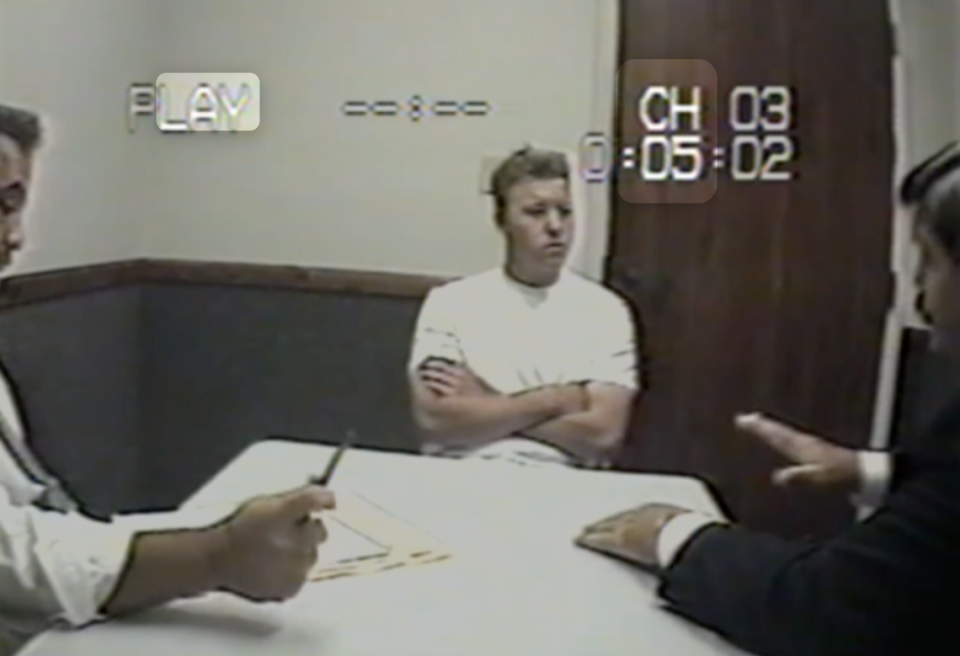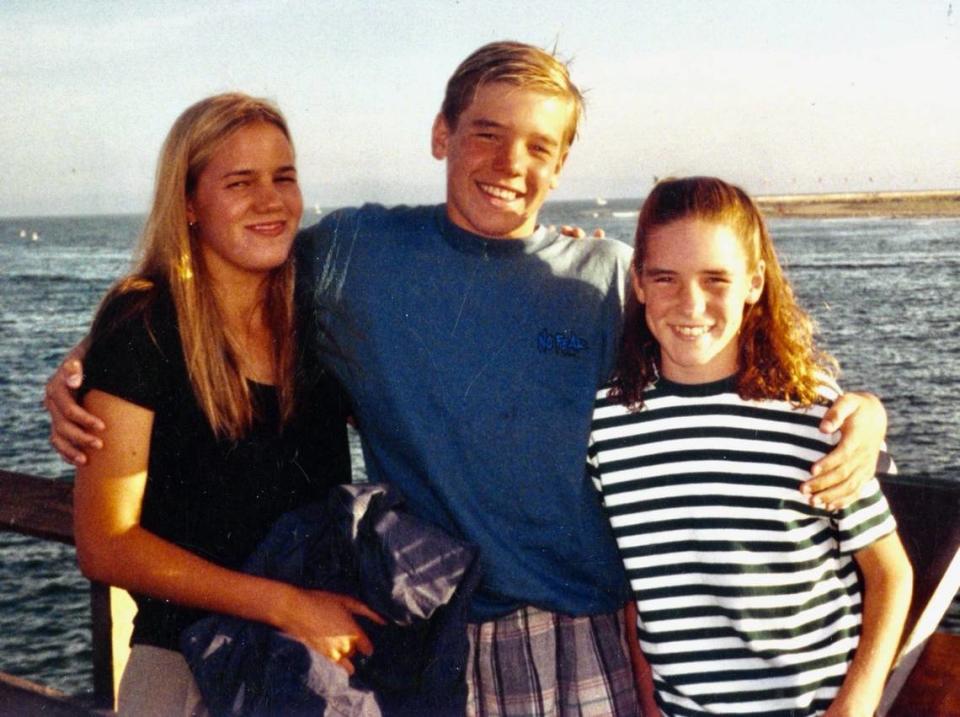Kristin Smart family sues Cal Poly, says university partly responsible for her murder
Cal Poly could have prevented Kristin Smart’s murder if the university had properly responded to reports of Paul Flores exhibiting harassing, stalking and violent behavior on campus, the student’s family alleged in a new wrongful death lawsuit filed Thursday.
The lawsuit comes about eight months after the university publicly apologized for the first time.
“We recognize, even though I wasn’t here, that Cal Poly could have done things differently,” Cal Poly President Jeffrey Armstrong told The Tribune in an exclusive May interview. “There were things that we do differently now. There are things that should have been done differently. And for that, I’m sorry.”
Paul Flores was convicted of Smart’s murder in October 2022 and sentenced to 25 years to life in prison in March — nearly 27 years after Smart first disappeared over Memorial Day weekend in 1996.
Kristin’s parents, Stan and Denise Smart, previously told The Tribune that the way Cal Poly handled the case continued to compound the trauma they’ve felt ever since they first received the phone call their daughter was missing.
“Paul Flores took Kristin’s life,” Denise Smart said in an exclusive interview in May. “Cal Poly took ours.”

Lawyers for the Smart family — Marc Lewis, Erin Reding and Taylor Chaplin — told The Tribune the public apology was the first time the family was aware that the university may have additional information about the handling of Smart’s case.
“It really wasn’t until that apology came out that the family began to understand Cal Poly’s failings,” Lewis said. “We don’t know what information the president had in his possession to make that apology, and it appears to us that Cal Poly has been sitting on information and keeping it from the Smart family for decades.”
According to Lewis, the family has never seen an investigative file regarding Smart’s disappearance from the university.
The family is suing the university for negligence, negligent infliction of emotional distress and wrongful death. The family did not request a specific sum in damages as part of the lawsuit.
“It’s the loss of a human life,” Lewis said. “Not to mention all the trauma brought to the family.”
The Smart family told The Tribune in an emailed statement there is no question Cal Poly failed their daughter before and after her murder by Flores.
“While President Armstrong’s acknowledgment of their failings is a step in the right direction, it cannot erase the pain and injustice we have endured,” the family said. “Kristin was not just a statistic; she was a vibrant, intelligent young woman with a promising future. We cannot bring Kristin back, but we can demand accountability and ensure no other family suffers the same fate.”
Cal Poly spokesperson Matt Lazier told The Tribune the university did not have comment on the lawsuit as it is a pending legal matter.

Lawsuit: Paul Flores reported to Cal Poly 4 times before Kristin Smart murder
Paul Flores was reported to Cal Poly at least four times before Smart’s murder in May 1996, the lawsuit alleged.
Lawyers said the new information cited in the lawsuit was recently discovered by the family but declined to say where they learned it from at this time.
The lawsuit alleged Cal Poly had records of all these reports at the time Smart disappeared.
On Dec. 17, 1995, a female Cal Poly student filed a university police report stating Flores had been harassing her, the lawsuit said. According to the lawsuit, Flores climbed the trellis of the student’s apartment building to spy on her from her balcony. Cal Poly police responded and found Flores on the scene and identified him as the “culprit,” the lawsuit said.
Then, on March 27, 1996, three female Cal Poly students filed university police reports that said Flores had been harassing and stalking them, the lawsuit said. They said he had been calling them for six weeks and filled their entire answering machine up with nothing but silent hang-up calls.
The same three woman told officers Flores had climbed on their balcony and tried to break into their apartment in December 1995, the lawsuit said.
Flores was then reported for vandalizing Cal Poly grounds and property while intoxicated on Jan. 14, 1996, according to the lawsuit.
Just days later, on Jan. 17, 1996, Cal Poly required Flores to attend a “Mediation/Information Meeting” because he had allegedly harassed a staff member at the university, according to the lawsuit. During that meeting, Cal Poly and Flores allegedly discussed “the seriousness of harassing a staff member at Cal Poly” and mentioned possibly canceling his housing contract with the university.

The lawsuit also claimed Flores was charged with assault and battery on Dec. 2, 1994, which could have been found by Cal Poly police if the agency had searched the California Law Enforcement Systems (CLETS) database that allows law enforcement to check criminal histories, driver records and other databases across agencies.
The reports should have prompted the university to conduct a thorough investigation of Flores, the lawsuit said.
“After becoming aware of five reports of Flores’ harassing, stalking and violent behavior, any reasonable university would have engaged in a disciplinary process related to Flores,” the lawsuit said. “In light of the seriousness of the reports, a reasonable university would have expelled, or at least suspended, Flores.”
If Flores were expelled or suspended, he would not have attended classes and could have lost his on-campus housing, which would have sent him to his family’s Arroyo Grande home “miles away from Kristin and the dorm room where he murdered her,” the lawsuit said.
“Cal Poly’s failure to investigate and discipline Flores for his behavior allowed Flores’ continued access to Kristin, continued access to the scene of the murder and at least partially caused Kristin’s murder,” the lawsuit said.
According to the lawsuit, the university’s sexual harassment policy states harassment and sexual conduct are prohibited by both the school’s standards and federal law known as Title IX. In Cal Poly’s current policy, the lawsuit said, the Title IX coordinator takes “immediate steps” to investigate sexual harassment claims which is then followed by a disciplinary process that could result in probation, suspension or expulsion.
While it’s unclear whether the policy was in place at the time of Smart’s disappearance, Title IX was enacted in 1972.
Cal Poly police botched initial investigation, lawsuit says
Smart went missing Memorial Day weekend of 1996, but the case wasn’t transferred to the San Luis Obispo County Sheriff’s Office until June 26, 1996 — a month after her disappearance. By then, the lawsuit said, the damage had already been done.
“Cal Poly’s egregious failures to pursue credible leads and conduct a proper investigation created a morass of problems that were impossible for the sheriff to easily untangle,” the lawsuit said.
The lawsuit said Smart’s friends and family reported her missing almost immediately after she disappeared.
Two of her friends contacted the university’s police department on Sunday — the next day — but police refused to take a report, the lawsuit said. Officers told her friends the agency wanted to wait until the holiday weekend was over.
Cal Poly officers also told Denise Smart her daughter probably went camping, despite Denise telling them it was uncharacteristic of Smart to do so, the lawsuit said.
The lawsuit said the Cal Police Police Department waited four days after Smart disappeared to take a missing person’s report, interview witnesses or interview Flores, “whom multiple witnesses informally identified as the last person seen with Kristin.”
The agency then did not search Flores’ dorm room until 16 days after Smart disappeared, the lawsuit said.
Flores was moved out of his dorm room by the time campus police sealed and restricted access to it, the lawsuit said. The school meanwhile allowed a custodial crew to fully sanitize the room before conducting a forensic investigation, the lawsuit said, potentially destroying evidence.
A formal crime scene investigation was not done in Flores’ dorm room until 31 days after Smart disappeared, the lawsuit said.
Cal Poly could have spared women from alleged Flores attacks and assaults, lawsuit says
The lawsuit further alleged that because of Cal Poly’s failures, Flores was able to hurt multiple women during the 25 years leading up to his April 13, 2021, arrest.
That included a number of incidents cited in the lawsuit, details of which lawyers for the family said came from news and investigative reports.
The lawsuit cited an incident in which Flores allegedly brought a plastic pitcher of a mixed alcoholic drink and pressured multiple girls to drink it at an Arroyo Grande High School prom after party about a week after Smart disappeared.
Then while working at Outback Steakhouse in 1997, the lawsuit claimed Flores carried a coworker into his apartment, turned off the lights and attempted to sexually assault her until she threatened to scream and wake up his sister.
Between 2004 and 2007, the lawsuit said Flores allegedly followed a woman when she went outside a Redondo Beach bar, grabbed her and attempted to get her into his car. She hit him and he hit her back, the lawsuit said, at which point other patrons came outside to investigate the disturbance and Flores fled.
The lawsuit then said in 2008 Flores met a woman at a bar, gave her a “glass of what was purportedly water” and the woman fell unconscious. The woman woke up several times to Flores raping her, including one time with a ball gag in her mouth.
The lawsuit also detailed an incident in 2011 in which Flores allegedly drugged and sexually assaulted a woman at a San Pedro bar. That same year, Flores was kicked of a San Pedro bar for stalking a woman and inappropriately touching another intoxicated woman, the lawsuit said.
The 2008 and 2011 stories were similar to the testimonies of two women who testified at Flores’ murder trial, but it was unclear from the lawsuit if these were the same incidents.
In January 2023, the Los Angeles County District Attorney’s Office told The Tribune there was insufficient evidence to prosecute Flores for an alleged rape in Redondo Beach in 2013.
The Los Angeles Police Department also tracked down two women who alleged Flores drugged and raped them, the lawsuit said, and investigators found home video files of Flores sodomizing and sexually assaulting women — many who were unconscious — in a folder labeled “Practice” in 2020.
Two bottles of date rape drugs were also found in Flores’ home in 2020, the lawsuit said.
According to Ruben Flores’ arrest warrant, investigators found Flexeril, a muscle relaxer, and Tramadol, a pain medication similar to morphine and fentanyl, in Paul Flores’ home during a 2020 search.
The video folder and several of the alleged assaults were also mentioned in the warrant.
“If Cal Poly had properly and reasonably investigated Kristin’s disappearance,” the lawsuit said, “the countless women that Flores attacked and assaulted, over the course of the subsequent 25 years, could have been spared the severe pain and trauma of those horrific experiences.”

Lawsuit: Cal Poly responsible for decades of trauma for Kristin Smart family
The lawsuit said the decades between Smart’s disappearance and Cal Poly’s public apology are “marked by extreme emotional distress and trauma.”
“While the Smart family certainly would have been devastated by the immediate arrest of Flores and the prompt discovery that Kristin had been murdered, it would have at least truncated the agony of simply not knowing what happened to their daughter and sister,” the lawsuit said.
The family tried to maintain hope that Smart would return home, but that hope was “repeatedly destroyed” over two decades, the lawsuit continued.
Flores being on the loose and freely living his life despite being the prime suspect in the case for 25 years was “agonizing” for the family, the lawsuit said, and their hearts broke each time they heard Flores allegedly victimized another woman.
The family has also continued to be traumatized by the fact that Smart’s body has never been found.
“Not knowing where Kristin’s remains are has prevented the family from ever feeling peace and has continued to give Flores power over them,” the lawsuit said.
To add insult to injury, the lawsuit said, the university gave Smart failing grades in the transcript her mother requested because she had not been able to attend her finals the semester she was murdered. It later changed her final grades to “W’s” to reflect “withdrawn.”

The lawsuit said Cal Poly Police Department’s mishandling of the first critical month of the investigation prevented law enforcement from being able to investigate and arrest Flores in a timely manner.
“If Cal Poly had conducted a reasonable investigation, Flores would have been arrested and convicted decades earlier,” the lawsuit said. “The Smart family would have been spared decades of emotional distress and trauma.”
The lawsuit added that if Cal Poly had done the “right thing from the outset,” Flores would have never had the opportunity to kill Kristin or allegedly victimize countless other women.
“Cal Poly’s failures are indefensible,” the lawsuit said. “It must be held accountable to prevent this cycle of callous negligence from ever occurring again.”
Smart family vs. Cal Poly lawsuit by Kaytlyn Leslie on Scribd

